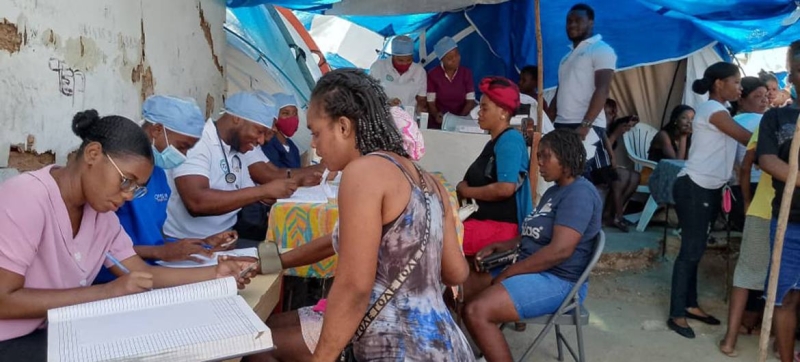
Women at a UNFPA-supported mobile clinic in Port-au-Prince. Women and girls are the first to suffer in any crisis, the UN calls for support Women
The year 2024 is marked by many conflicts and crises, and they are growing. UNFPA, the UN agency for sexual and reproductive health, has appealed to the international community for $1.4 billion to help women and girls in dire situations.
UNFPA highlights global trends that could pose a serious threat to the world’s population in the coming year, and stresses that without urgent action, the situation for women and girls will only worsen.
Women and girls are in the most painful situation
Armed conflicts are on the rise, and extreme weather events and forced displacement are reaching record levels. In these emergency situations, women and girls face special challenges that are often ignored.
Crises often unfold in countries where women’s rights are already being violated. For example, of the countries that have seen the largest influxes of internally displaced people fleeing natural disasters, one-third are among the places with the highest levels of gender inequality in the world.
At the same time, in almost all crisis situations, women and girls face a sharp increase in gender-based violence. On average, it is twice as high as under normal circumstances.
Thus, UNFPA emphasizes, any conflicts, natural disasters and situations of mass displacement become especially painful for women and girls. In particular, they need feminine hygiene products, contraception, they need specific medical support in case of pregnancy and during childbirth. And in emergency situations, sexual and reproductive health services are often relegated to the background.
UNFPA helps women and girls even in the most dangerous conditions
UNFPA and its partners work to help women and girls even in the most dangerous and difficult conditions. In 2024, the agency provided reproductive health services to 10 million people in 59 countries, including contraception, menstrual hygiene products, antenatal and postnatal care, and obstetric care at birth. UNFPA also took action to protect 3.6 million women and girls from gender-based violence.
However, the agency emphasizes that millions more women and girls need help.
Global Cooperation and Humanitarian Funding Are Under Threat
The UN also notes the rise of general mistrust and nativist tendencies in the world, which threatens the international cooperation so necessary to combat violence, conflicts and natural disasters.
One of the most important forms of global cooperation is humanitarian funding. And the funding gap becomes especially obvious when it comes to programs for women and girls. For example, on a global scale, it is usually difficult to raise the necessary amount to combat gender-based violence: as of November 24 of this year, only 27 percent of the requested funds had been received.
Even more serious shortfalls are expected next year, when an estimated 11 million pregnant women will require humanitarian assistance in times of crisis and 92 million people are projected to require protection from gender-based violence.
Support for women’s rights is eroding
The world faces persistent resistance to protecting the rights of women and girls, including their sexual and reproductive rights. New data released this year show that in 40 per cent of countries, women’s ability to exercise their right to bodily autonomy is declining.
“Reproduction is being politicized,” said UNFPA Executive Director Natalia Kanem. “Nevertheless, we can and must move forward,” she added.
UNFPA to strengthen emergency preparedness
Despite financial constraints, UNFPA deploys thousands of midwives and health teams to conflict and disaster zones. In 2024, UNFPA equipped more than 3,500 health facilities to provide care to women and girls and created more than 1,600 safe places for them to seek refuge.
Next year, UNFPA will strengthen its response and improve emergency preparedness. The coming year will bring many challenges, but the agency is prepared to overcome them and calls on countries to stand in solidarity. “The way forward, the way we operate and achieve success, is working together,” Kanem said.
